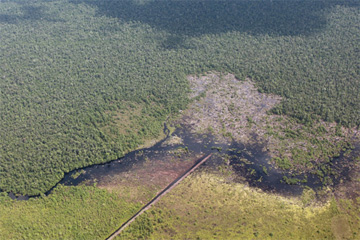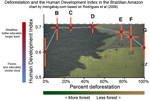Summary:
Payments for conservation and sustainable management of forests could turn agents of forest destruction into forest protectors, according to a comprehensive analysis of national policy options to reduce deforestation released in Copenhagen by the Center for International Forestry Research (CIFOR).
While cautioning that past efforts to reduce forest loss have failed more often than they have succeeded, the 400-page Realising REDD+: National strategy and policy options says that payments for forest protection could “finally provide the all-important political will for meaningful action in developing countries.”
 Draining and clearing of peat forest in Central Kalimantan (May 2009). Photo by Rhett A. Butler. |
“Payments for environmental services (PES) schemes have many advantages—the incentives for forest users are strong. Those responsible for cutting emissions are compensated directly. But there are many opportunities to make rapid progress with the REDD+ agenda that don’t depend on the long-term reforms required for PES programmes,” Arild Angelsen, a CIFOR scientist who was the main editor of Realising REDD+, said in a statement. “Most of what will be undertaken at the national and local levels has in fact been attempted before. We can learn a lot by looking at what has worked and, equally important, what has not.”
The report urges policymakers to look beyond the forestry sector to address broad causes of deforestation, including agriculture and energy use. It notes that important reforms — including clarification of land ownership, monitoring of carbon stocks, and establishing systems for fair distribution of payments — will be necessary to ensure REDD+’s success.
“Designed appropriately, REDD+ has the potential to catalyze needed reforms, while protecting vulnerable communities,” said Frances Seymour, CIFOR’s director general, in a statement. In a world facing catastrophic climate change, the risk of doing nothing is too great.”
Angelsen, A.; Brockhaus, M.; Kanninen, M.; Sills, E.; Sunderlin, W.D.; Wertz-Kanounnikoff, S.; Abdel Nour, H.O.; (eds.) (2009). Realising REDD+: National strategy and policy options
PDF: English (3.9 MB). CIFOR.
Related articles
Destruction of old-growth forests looms over climate talks

(12/08/2009) Destruction of old-growth or primary forests looms large in discussions in Copenhagen over a scheme to compensate tropical countries for reducing emissions from deforestation and degradation (REDD). Some environmental groups are pressing for conservation of old-growth forests — the most carbon-dense, and biologically-rich state of forests — to be the centerpiece of REDD, while industry and other actors are pushing for “sustainable forest management” or logging using reduced-impact techniques to be the primary focus of REDD.

(11/17/2009) Reducing Emissions from Deforestation and Degradation [REDD] programs that include landowners will conserve more habitat and ensure greater ecosystem services function than programs that focus solely on protected areas, report researchers from the Woods Hole Research Center (WHRC), the Instituto de Pesquisa Ambiental da Amazônia (IPAM), and the Universidade Federal de Minas Gerais (UFMG).
Without reinstatement of key provision, REDD could subsidize large-scale forest destruction
(11/02/2009) The elimination of a key provision from the negotiating text for the Reducing Emissions from Deforestation and Degradation in developing countries (REDD) mechanism could turn the proposed climate change mitigation scheme into a subsidy for large-scale conversion of natural forests to industrial plantations, warned environmentalists today at the resumption of U.N. climate change negotiations in Barcelona.
Investing in conservation could save global economy trillions of dollars annually
(09/03/2009) By investing billions in conserving natural areas now, governments could save trillions every year in ecosystem services, such as natural carbon sinks to fight climate change, according to a European report The Economics of Ecosystems and Biodiversity (TEEB).
Are we on the brink of saving rainforests?

(07/22/2009) Until now saving rainforests seemed like an impossible mission. But the world is now warming to the idea that a proposed solution to help address climate change could offer a new way to unlock the value of forest without cutting it down.Deep in the Brazilian Amazon, members of the Surui tribe are developing a scheme that will reward them for protecting their rainforest home from encroachment by ranchers and illegal loggers. The project, initiated by the Surui themselves, will bring jobs as park guards and deliver health clinics, computers, and schools that will help youths retain traditional knowledge and cultural ties to the forest. Surprisingly, the states of California, Wisconsin and Illinois may finance the endeavor as part of their climate change mitigation programs.
Indonesia releases revenue sharing rules for REDD forest carbon projects

(07/13/2009) Indonesia has released revenue sharing rules for forest carbon projects, reports Reuters. According to a document released by the forestry ministry, the profit-sharing depends on the type of forest ownership or permit, ranging from 10 to 50 percent for the government, 20 to 70 percent for local communities, and 20 to 60 percent for developers. Projects in areas classified as “protected forest” would see 50 percent go to the government, 20 percent to local communities, and 30 percent to developers, while for projects in indigenous forest the breakdown would be 10% to the government, 70 percent to the community, and 20 percent to the developer.
Amazon deforestation doesn’t make communities richer, better educated, or healthier

(06/11/2009) Deforestation generates short-term benefits but fails to increase affluence and quality of life in the long-run, reports a new study based an analysis of forest clearing in 286 municipalities across the Brazilian Amazon. The research, published in Friday’s issue of the journal Science, casts doubt on the argument that deforestation is a critical step towards development and suggests that mechanisms to compensate communities for keeping forests standing may be a better approach to improving human welfare, while simultaneously sustaining biodiversity and ecosystem services, in rainforest areas.

(06/09/2009) A global framework on climate change must immediately halt deforestation and industrial logging of the world’s old-growth forests, while protecting the rights of forest communities and indigenous groups, said a broad coalition of activist groups in a consensus statement issued today at U.N. climate talks in Bonn Germany. The statement said the successor treaty to the Kyoto Protocol should not include mechanisms that allow industrialized countries to “offset” their emissions by purchasing carbon credits from reducing deforestation in developing countries, a position that puts the coalition at odds with larger environmental groups who say a market-based approach with tradable credits is the only way to generate enough money fund forest protection on a global scale.